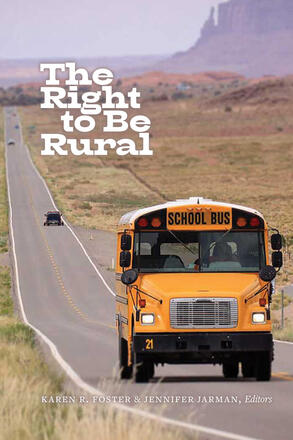
The Right to Be Rural
Categories: Social Sciences, Sociology, Law & Legal Studies, Law & Society, Environmental & Nature Studies, Business, Economics & Industry, Economics, Education, Geography, Geography, Environmental Protection & Preservation, Political Science, Security, Peace & Conflict Studies, Human Geography
Publisher: University of Alberta Press Show Edition Details
Ebook (EPUB) : 9781772125948, 384 pages, March 2022
Ebook (PDF) : 9781772125955, 384 pages, March 2022
- Short alternative textual descriptions.
- Contains a table of contents that provides direct access to all chapters of the text via links.
- A page list enables users to coordinate their reading with a statically paginated version.
- Single logical reading order.
Table of contents
Acknowledgments ix
1 Geographies of Citizenship, Equity, Opportunity, and Choice 1
Karen R. Foster & Jennifer Jarman
I The Right to Rural Education
2 The Right to Language in Rural Nova Scotia, Canada 19
Katie K. MacLeod
3 Experiencing an Active Citizenship 35
Democratic and Inclusive Practices in Three Rural Secondary Schools in Spain
Laura Domingo-Penafiel, Laura Farre-Riera & Nuria Simo-Gil
4 Hallway Pedagogy and Resource Loss 51
Countering Fake News in Rural Canadian Schools
Ario Seto
II The Right to Rural Livelihoods
5 Stemming the Tide 71
Youth Entrepreneurial Citizenship in Rural Nova Scotia, Canada
Gregory R. L. Hadley
6 Dispossession, Environmental Degradation, and the Right to Be Rural 91
The Case of Small-Scale Fishers in Chilika Lagoon, India
Pallavi V. Das
III The Right to Rural Health
7 Reproducing the Rural Citizen 107
Barriers to Rural Birthing and Maternity Care in Canada
Sarah Rudrum, Lesley Frank & Kayla McCarney
8 Rural Food 123
Rights and Remedies for Older Persons in Canada
Kathleen Kevany & Al Lauzon
9 The Multifaceted Sense of Belonging 141
Discursive Conceptions of Home by Third Age Residents in Rural Finland
Katja Rinne-Koski & Sulevi Riukulehto
IV The Right to Rural Representation
10 Citizens or Individuals? 159
Patterns of Local Civic Engagement of Young University Graduates Living in Rural Areas in Poland
Ilona Matysiak
11 Beyond the “Rural Problem” 177
Comparing Urban and Rural Political Citizenship, Values, and Practices in Atlantic Canada
Rachel McLay & Howard Ramos
12 Defining Indigenous Citizenship 193
Free, Prior, and Informed Consent (FPIC), the Right to Self-Determination, and Canadian Citizenship
Satenia Zimmermann, Sara Teitelbaum, Jennifer Jarman
& M. A. (Peggy) Smith
V The Right to Rural Policy
13 Density Matters and Distance Matters 211
Canadian Public Policy from a Rural Perspective
Ray D. Bollman
14 Rural Citizenship Under the Impact of Rural Transformation 237
Unpacking the Role of Spatial Planning in Protecting the Right to Be Rural in Zimbabwe
Jeofrey Matai & Innocent Chirisa
15 The Right to Multiple Futures in the Shadow of Canada’s Smart City Movement 253
S. Ashleigh Weeden
16 “What Makes Our Land Illegal?” 271
Regularization and the Urbanization of Rural Land in Ethiopia
Eshetayehu Kinfu & Logan Cochrane
VI The Right to Rural Mobility
17 Exploring Rural Citizenship through Displacement 289
An Analysis of Citizenship in the Context of Refugee Resettlement and Integration in Rural Canada
Stacey Haugen
18 Local Politics of Inclusion and Exclusion 303
Exploring the Situation of Migrant Labourers and their Descendants after Land Reform in Rural Zimbabwe
Clement Chipenda & Tom Tom
19 Rural Redlining in the Danish Housing Market 321
Toward an Analytical Framework for Understanding Spatial (In)justice
Jens Kaae Fisker, Annette Aagaard Thuesen
& Egon Bjornshave Noe
20 What’s Next for the Right to Be Rural? 339
Jennifer Jarman & Karen R. Foster
Contributors 351
Index 365"
Description
In this collection, researchers analyze rural societies, economies, and governance in North America, Europe, Africa, and Asia through the lens of rights and citizenship, across such varied domains as education, employment, and health. The provocative concept of a “right to be rural” illuminates not only the challenges faced by rural communities worldwide, but also underappreciated facets of community resilience in the face of these challenges. The book’s central question—“is there a right to be rural?”—offers insights into how these communities are created, maintained, and challenged. The authors illustrate that citizenship rights have a spatial character, and that this observation is critical to studying and understanding rural life in the twenty-first century. Scholars and policymakers concerned with the health and well-being of rural communities will be interested in this book.
Contributors: Ray Bollman, Clement Chipenda, Innocent Chirisa, Logan Cochrane, Pallavi Das, Laura Domingo-Peñafiel, Laura Farré-Riera, Jens Kaae Fisker, Karen R. Foster, Lesley Frank, Greg Hadley, Stacey Haugen, Jennifer Jarman, Kathleen Kevany, Eshetayehu Kinfu, Al Lauzon, Katie MacLeod, Jeofrey Matai, Ilona Matysiak, Kayla McCarney, Rachel McLay, Egon Noe, Howard Ramos, Katja Rinne-Koski, Sulevi Riukulehto, Sarah Rudrum, Ario Seto, Nuria Simo-Gil, Peggy Smith, Sara Teitelbaum, Annette Aagaard Thuesen, Tom Tom, Ashleigh Weeden, Satenia Zimmermann